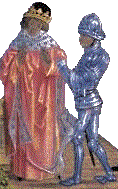
The revolt of Owain Glyndwr
Wales in 1400: 2
 Seeds of revolt
Seeds of revoltThe political situation also contributed to the uncertainty of the period. In the first place, a truce had been called in the wars with France (which we now call the Hundred Years War) in 1389. The wars had offered the Welsh opportunities for adventure, promotion and profit (as the historian R.R. Davies has put it, "the Welsh were the Gurkhas of the English armies of the middle ages"); with the truce, all that came to an end, for the foreseeable future at least.
 Also
adding to the uncertainty, in 1399 Richard II was himself overthrown,
by Henry Bolingbroke, who became Henry IV (and who held the lordship
of Brecon through his wife). This may have been a further blow
to Welsh hopes, as it had looked as if Richard were building
up a power base at Chester with a view to ruling his kingdom
from the west. In the space of a few years everything in Welsh
politics had changed.
Also
adding to the uncertainty, in 1399 Richard II was himself overthrown,
by Henry Bolingbroke, who became Henry IV (and who held the lordship
of Brecon through his wife). This may have been a further blow
to Welsh hopes, as it had looked as if Richard were building
up a power base at Chester with a view to ruling his kingdom
from the west. In the space of a few years everything in Welsh
politics had changed.
Finally, the Black Death (Y Farwolaeth Fawr) had been as devastating in Wales as in the rest of Europe, producing a basic conflict between labourers and landowners (fewer labourers meant that they were more in demand, while at the same time landowners applied ever more restrictive laws to tie them to the land).